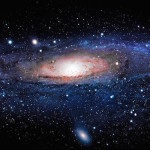The Key Divine Attributes of the Absolutely Unique and Simple Unconditioned Reality
by Karlo Broussard
Filed under The Existence of God
NOTE: Today we continue our six-part series by Karlo Broussard on a metaphysical proof for God's existence. The posts will run each of the next three Mondays:
- Part 1 - Why Must There Be at Least One Unconditioned Reality?
- Part 2 - The Absolute Simplicity of Unconditioned Reality
- Part 3 - The Absolute Uniqueness of Unconditioned Reality
- Part 4 - The Key Divine Attributes of the Absolutely Unique and Simple Unconditioned Reality
- Part 5 - Key Attributes: Perfection the Three Omnis
- Part 6 - Important Features of the Metaphysical Proof
Over the course of several posts we’ve been examining a metaphysical demonstration for God’s existence that has led us to conclude that there must exist one and only one unconditioned reality in all of reality, and that such a reality is absolutely simple in the metaphysical sense (reality that is pure being or pure existence). In the current post, I intend to further our argument that unconditioned reality is worthy of the term “God,” as classically defined, by laying out key divine attributes for this absolutely simple and unique unconditioned reality.
The first key attribute is that the unconditioned reality is the continuous creator of all else that is. We can begin by recalling what we’ve seen in part 1 of this metaphysical proof and that is the fact that every conditioned reality, in order to exist right here and right now, must ultimately have its conditions fulfilled by at least one unconditioned reality; otherwise the particular conditioned reality under consideration, say a cat, would not exist. It is in this sense that we can call such an unconditioned reality a Creator – it ultimately fulfills the conditions that a conditioned reality depends upon for its existence (it is the ultimate source of the conditioned reality’s being). This is in contrast to the more restricted or narrower sense of a creative agent that is responsible for the creation of the universe from nothing at some point in the finite past.
Now, since there can be only one unconditioned reality (as proven in the third installment of this series), it follows that every other existing thing is a conditioned reality, which means that in order for it to exist right here and right now, it would ultimately have to have its conditions fulfilled by the one unconditioned reality. Therefore, at every moment one could say that a conditioned reality (e.g., a cat) exists, that conditioned reality would owe its existence to the one unconditioned reality. Hence, the Creator (the unique, absolutely simple, and unconditioned reality) must be the continuous Creator (the ultimate source of fulfillment of conditions) of all else that is real at every moment it exists. This is the rationale behind the popular phrase, “If God would stop thinking about us, we would lapse into nothingness.”
The second key attribute is that of immutability (the inability to change). Change, as defined in the Aristotelian-Scholastic tradition, is simply the actualization of a potential within a being. For example, the cold tea that’s been sitting on my desk all afternoon has the potential to become hot and when I put it in the microwave or on the stove to re-heat it that potential will be made actual. As you read this article, you have the potential to learn something about change. Hopefully upon completing this article, you will have actualized that potential and thus will have experienced a growth in knowledge, i.e., change.
Now, every instance of change requires a changer (there must exist something that brings about the change). To use our previous example, the cold tea becomes hot due to the electromagnetic radiation in the microwave or the heat on the stove. Such a principle is not merely derived from our experiential knowledge of examples, like the tea getting hot, but from the very nature of change itself, which, recall, is the actualization of some potential. The tea’s potential to become hot cannot be actualized without something already actual precisely because the hotness of the tea is a mere potential when it is cold.
Furthermore, that which actualizes the tea’s potential for hotness would have to be something other than the tea itself. It could not actualize its own potential for hotness because in such a case it would have to be actually hot prior to actualizing the potential to become hot. In other words, it would have to be actually hot and potentially hot in the same respect at the same place and time. Obviously this amounts to an intrinsic contradiction and thus cannot be true. Therefore, the tea’s potential to become hot can only be actualized by something already actual and that something must be something other than the tea itself.
In light of this understanding of change, there are two ways in which we can see why the unconditioned reality cannot change.
First, if the one unconditioned reality could change, then that would mean it would depend upon something outside itself to actualize its potential, in which case an aspect of its being would be conditioned by that actualizer. But the unconditioned reality cannot have any aspect of its being that is conditioned by something outside itself for the simple reason that it is unconditioned reality. Therefore, the unconditioned reality cannot change.
The second line of reason that precludes mutability for the unconditioned reality involves its absolute simplicity (or the fact that it is pure being or pure existence without any real or really possible incompatible state of being on the same level of simplicity). According to the Aristotelian-Scholastic tradition, something that is pure being or pure existence is that which is purely actual. The reason is that something is in act in as much as it exists. To return to our previous example, the state of hotness for the tea did not exist until the heat on the stove made it actual. Grant it the potential for hotness was present in the tea in a way that other potentials are not (such as the potential to become a dragon) but it was not there actually while the tea was still cold. Therefore, existence and actuality are interchangeable. So, if unconditioned reality is pure existence then it must be pure actuality.
Now, something lacks potentiality in as much as it is in act. The cold tea has the potential for hotness but lacks or loses that potential when it becomes actually hot. So, if unconditioned reality is pure actuality, then it would be devoid of all potentiality – that is to say there is no aspect of being that a purely actual being can potentially acquire or lose.
Now, if change involves the actualization of some potential, and unconditioned reality has no potentiality whatsoever, then it logically follows that unconditioned reality cannot be subject to change. Therefore, the unconditioned reality is immutable.
The next attribute for consideration is eternality (atemporality or timelessness). There are two ways in which we can argue for this attribute.
The first is by way of absolute simplicity. Recall how we saw in the previous post on the absolute uniqueness of unconditioned reality that unconditioned reality cannot be restricted in its mode of existence by a temporal restriction – making it exist now instead of then. As was proven, such an intrinsic restriction for unconditioned reality would allow for a real or really possible incompatible state of being on the same level of simplicity that would be excluded from it. But as was also proven unconditioned reality cannot have any real or really possible incompatible states of being on the same level of simplicity that would be excluded from it less we end up with an intrinsic contradiction. Therefore, the unconditioned reality cannot be limited in its mode of existence by a temporal restriction. In other words, it cannot be conditioned by time; thus it must be eternal.
The second way to argue for the eternality of the unconditioned reality is from the attribute of immutability. We know from our experience and reason that mutability (or changeability) is an essential element of time. Anything existing in time goes from one point in time to another – your act of reading the words in the previous clause has now become your past (there has been a change). But as proven above the unconditioned reality cannot change. Therefore, the unconditioned reality cannot be conditioned by time in any sense but must exist outside of time altogether – it neither comes to be nor passes away – it cannot have any successive moments in its existence whatsoever. This is the essence of eternality.
Now, the argument for the attribute of immateriality follows a very similar line of reason as does the argument for eternality.
First, if the unconditioned reality was restricted in its mode of existence by matter, then it would be restricted by a spatial restriction since all matter has extension in space – it would exist here instead of there. Now, such an intrinsic restriction would allow for a real or really possible incompatible state of being that would be excluded from it. But recall that the unconditioned reality cannot have any real or really possible incompatible states of being on the same level of simplicity that would be excluded from it less we end up with an intrinsic contradiction. Therefore, the unconditioned reality cannot be restricted in its mode of existence by a spatial restriction. And if the unconditioned reality cannot be restricted by a spatial restriction, then it cannot be restricted by matter. In other words, it must be immaterial.
Furthermore, like eternality, the second argument for immateriality comes from the immutability of the unconditioned reality. We know from our experience and from reason that all material things are subject to change. The reason is that all material things have potentiality built into them. The tree has the potential to be cut down; it’s wood to be made into paper. My body has the potential to break down into its component parts and become dust in the grave. The hot tea has the potential to become cool. So, everything that is material is subject to change. But, as proven above, the unconditioned reality is immutable. Therefore, the unconditioned reality must be immaterial.
So, along with the key attributes of absolute simplicity and uniqueness (discussed in the previous posts of this series), unconditioned reality is also immutable, eternal, immaterial, and the continuous creator of all else that is. This surely fits the traditional description of “God.”
But is there more? Can we go further in deducing key attributes for the one unconditioned reality that have been classically ascribed to God? The answer is yes. In the next post for this series, I will consider the absolute perfection of the one unconditioned reality along with the three “omnis” – omnibenevolence, omnipotence, and omniscience.
Related Posts
Note: Our goal is to cultivate serious and respectful dialogue. While it's OK to disagree—even encouraged!—any snarky, offensive, or off-topic comments will be deleted. Before commenting please read the Commenting Rules and Tips. If you're having trouble commenting, read the Commenting Instructions.













